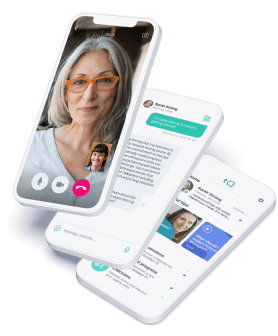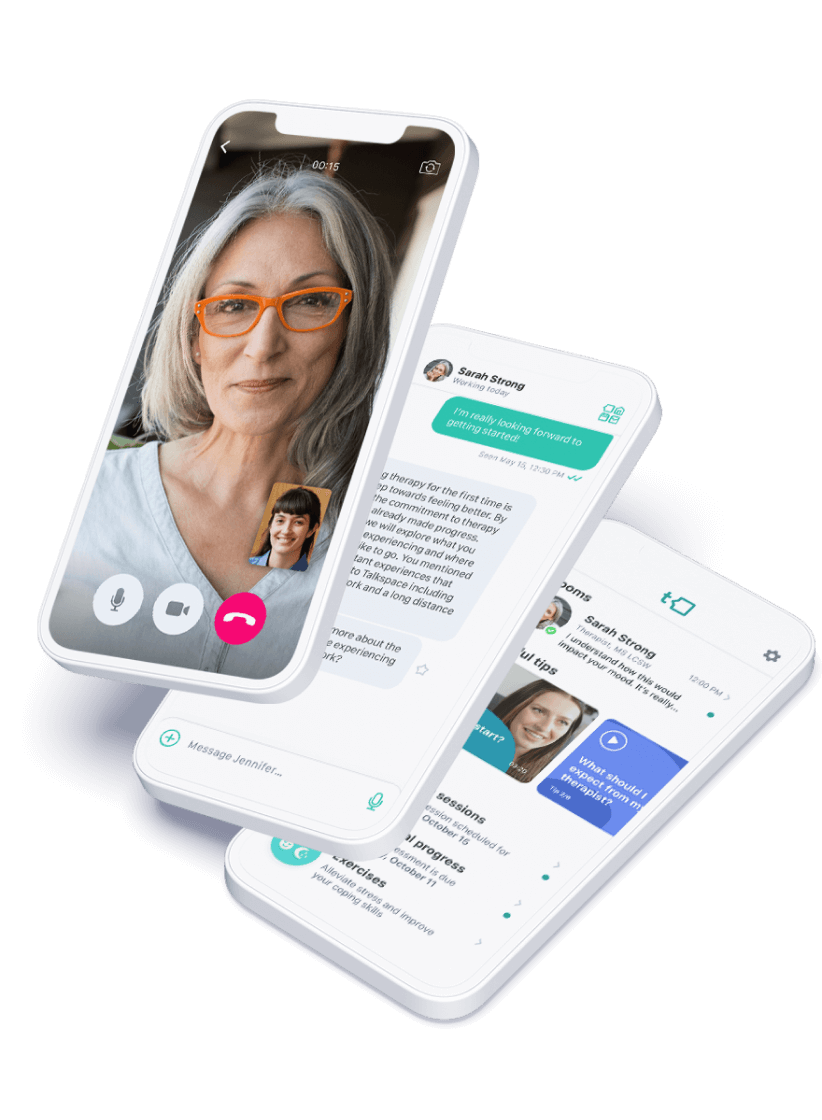Updated On: July 2, 2024
Overview
We all get anxious now and then. It’s completely natural (and often healthy) to experience tension, dread, and even fear when our instincts perceive a threat. These are healthy fight-or-flight reactions, and they keep us safe.
That said, some people suffer from chronic feelings of nervousness, terror, and excessive anxiety, even in everyday situations. Everyday anxiety can detract from your quality of life.
Learning how to deal with anxiety can certainly be challenging, but the proven tips we’re sharing here can help you learn how to better deal with anxiety symptoms and improve your mental health, starting today. Read on to learn several effective techniques designed to help you when dealing with anxiety.
Here are 12 ways to cope with anxiety that you can begin practicing today.
Online therapy for anxiety
Get support for anxiety fast and reach a calmer mindset. Therapy for anxiety is covered by most insurance plans.
1. Find Ways to Calm Anxiety
There are many ways to deal with anxiety symptoms so you can enjoy every day more. The key is to learn to anticipate and recognize your anxious thoughts as they arise, and then figure out which proactive steps you can take to combat them.
The good news is that you can do many of these without anyone’s help (although it is nice to have support). You don’t need equipment, gym memberships, or anything else to change course and get control of your anxiety levels. Knowing how to cope with anxiety starts right now. Some helpful ways to ease your anxiety might include:
- Taking a bath
- Going for a walk
- Meditation
“Dealing with anxiety is so hard because it feels like our thoughts are out of control. Coping mechanisms entail challenging, rerouting, distracting, or calming the thoughts that often plague us. There are many ways to accomplish this, but it’s important that it resonates with the person who is practicing it, so it creates an empowering environment.”
 Doctor of Psychology (PsyD.), Licensed Professional Counselor (LPC) Meaghan Rice
Doctor of Psychology (PsyD.), Licensed Professional Counselor (LPC) Meaghan Rice
2. Breathing Techniques
Your breath is your first connection to life. When you pay attention to your breathing, it helps block out anxious thoughts that may be affecting you. In studies, breathing exercises have shown significant efficacy in dealing with anxiety.
“Boxed breathing is both easy and effective. It requires us to inhale to the count of 4. Hold our breath for the count of 4. Exhale to the count of 4. It’s impossible for negative thoughts to come in while we are paying attention to our breath and the counting process at the same time.”
 Doctor of Psychology (PsyD.), Licensed Professional Counselor (LPC) Meaghan Rice
Doctor of Psychology (PsyD.), Licensed Professional Counselor (LPC) Meaghan Rice
3. Write A Daily Gratitude List
Each morning, start your day by writing a gratitude list. Documenting the things you’re grateful for can be a great way to set your mind at ease from that anxious feeling. It’s a gentle reminder that you have a lot of good in your life. There really is power in positivity, and neuroscience can now prove it. Research shows that gratitude activates multiple regions of the brain, including psychological well-being.
“Finding ways to reroute negative thoughts is essential. We can do this by running through different items in our life that we are grateful for. Continuing to marinate in those thoughts until we find some alleviation.”
 Doctor of Psychology (PsyD.), Licensed Professional Counselor (LPC) Meaghan Rice
Doctor of Psychology (PsyD.), Licensed Professional Counselor (LPC) Meaghan Rice
4. Journaling
You can do more than just list what you’re grateful for, though. Writing down your daily thoughts, fears, and feelings in a journal can help you stay in touch with what motivates (and depresses) you. A journal is also an excellent tool to share with a therapist, so you can create a plan using the most effective techniques and tools based on your specific experience with anxiety.
5. Physical Activity
Daily physical activity has immeasurable health benefits. Exercising improves mood, reduces stress, burns unhealthy fat storage, increases flexibility, flushes out toxins, moves lymph through the lymphatic system, tones the muscles, and so much more. It also works to reduce anxiety.
6. Eating Healthy
Being stressed out and having high anxiety levels can cause physiological, psychological, and physical symptoms that your body must endure. A healthy diet based on multi-colored plants, unprocessed foods, healthy fats, and lean meats will go a long way towards helping your mind and body whether you are dealing with stress or anxiety.
7. Get Proper Rest
The optimal amount of sleep each night can vary from person to person. That said, if you’re dealing with anxiety, it’s essential you get the right amount of sleep for your own personal sleeping needs. Research shows us that getting enough sleep helps maintain optimal cognitive function and avoid any negative thoughts or emotions like anxiety, depression, and irritability.
8. Be Careful with the Caffeine
Be mindful of your intake of coffee, tea, and other caffeinated beverages. Caffeine excites the brain and nervous system and can exacerbate anxiety disorder symptoms.
9. Stop Using Tobacco Products
Smoking and using other tobacco products has been proven multiple times to have serious health implications. Studies confirm that nicotine worsens anxiety disorder symptoms, causes cancer, contributes to cardiovascular disease, and results in a general lack of health.
10. Practice Visualization
People have been practicing visualization techniques for thousands of years — because they work. See yourself not being anxious. See yourself being confident in a normally stressful situation that would give you anxiety. See yourself being a person who is calm, relaxed, and collected in every situation. Combining your visualization practice with mantras (where you repeat calming, motivating, or affirming statements) can be even more effective.
11. Get Out of the House
Don’t allow your anxiety symptoms to keep you away from friends, family, and other people you love. You may feel the need to avoid social situations. However, doing so can worsen your symptoms over time. Talk to people you trust about how you’re feeling and let them be a support system. We all need help sometimes, and there’s no shame in that.
12. Seek Different Types of Therapy for Anxiety
Consider how to treat anxiety with therapy. Several different types of therapy can help people who live with anxiety better manage their symptoms. The following therapy techniques can all be effective:
The best anxiety treatment will depend on your unique situation, symptoms, and your individual responsiveness to therapy.
Cognitive behavioral therapy (CBT)
Cognitive behavioral therapy works to shift your perceptions and behaviors by addressing the thoughts, values, attitudes, and beliefs you have in your present life vs. digging into things of your past.
“Cognitive Behavioral Therapy (CBT) works effectively with those who struggle with anxiety and/or PTSD. The idea is that we’re challenging dysfunctional beliefs, perspectives, and schemas in order to restructure how we feel and then behave. Feeling empowered that we can control our thoughts is essential.”
 Doctor of Psychology (PsyD.), Licensed Professional Counselor (LPC) Meaghan Rice
Doctor of Psychology (PsyD.), Licensed Professional Counselor (LPC) Meaghan Rice
Dialectical behavioral therapy (DBT)
DBT is a type of CBT. It’s research-based psychotherapy used to treat a variety of personality disorders, interpersonal conflicts, mood disorders, behavioral changes, suicidal ideation, and substance abuse. DBT works for people with anxiety by helping improve emotional regulation so you can manage a negative thought or emotion better.
Exposure therapy
Exposure therapy is a set of sessions that gradually subject you to what causes an anxious feeling. It’s done so in a safe, unbiased, non-threatening environment so you know there’s no real danger present. For instance, if you have arachnophobia (a fear of spiders), your anxiety treatment may involve looking at pictures of spiders in their natural habitats to see that they’re not “out to get you.” Gradually, as your tolerance builds, the exposure will increase, until you’re able to react in a rational manner rather than with intense fear or anxiety.
13. Join a Support Group for Anxiety
Joining a local community support group is one of the best ways to deal with anxiety. You may be surprised to learn how many people in your community suffer from the same troublesome thoughts and behaviors as you do. Do a quick search to discover all of the groups in your area.
Find Anxiety Support with Talkspace
If you’re considering therapy for anxiety, Talkspace is an online therapy platform that pairs you with a skilled and experienced therapist who can treat your specific needs. Our approach to therapy is different — designed with convenience in mind, all from the comfort of your home or preferred space.
Enjoy learning about and practicing natural ways you can get in touch with yourself better to combat your anxiety. On your own, with the support of your friends and family, with the help of a support group, or with the guidance of a therapist, you don’t have to live with overwhelming anxiety any longer. You are in charge of your life, and you can do this!
When struggling with suicidal thoughts or distress, call the National Suicide Hotline at 1-800-273 TALK (8255). Anyone who is uncomfortable talking on the phone can text “NAMI” to 741-741 to be connected to a free, trained crisis counselor on the Crisis Text Line.
See References
-
The Effect of Diaphragmatic Breathing on Attention, Negative Affect and Stress in Healthy Adults
Ma X, Yue Z, Gong Z et al. Front Psychol. 2017;8. doi:10.3389/fpsyg.2017.00874. Accessed February 19, 2022.
-
The Neuroscience and Positive Impact of Gratitude in the Workplace
Roszak Burton, BS, ACC L. Physicianleaders.org. Published 2020. Accessed February 19, 2022.
-
Exercise for Stress and Anxiety
Anxiety and Depression Association of America, ADAA. Adaa.org. Published 2021. Accessed February 19, 2022.
-
Sleep and anxiety disorders
Dialogues Clin Neurosci. 2003;5(3):249-258. doi:10.31887/dcns.2003.5.3/lstaner. Accessed February 19, 2022.
-
How cigarette smoking may increase the risk of anxiety symptoms and anxiety disorders: a critical review of biological pathways
Moylan S, Jacka F, Pasco J, Berk M. Brain Behav. 2013;3(3):302-326. doi:10.1002/brb3.137. Accessed February 19, 2022.
-
Nature-Based Guided Imagery as an Intervention for State Anxiety
Nguyen J, Brymer E. Front Psychol. 2018;9. doi:10.3389/fpsyg.2018.01858. Accessed February 19, 2022.
-
Facts & Statistics
Anxiety and Depression Association of America, ADAA. Adaa.org. Published 2021. Accessed February 19, 2022.

Wendy Wisner is a freelance writer and lactation consultant (IBCLC) whose work has appeared on/in The Washington Post, Family Circle, ELLE, ABC News, Parents Magazine, Scary Mommy, Babble, Fit Pregnancy, Brain Child Magazine, Lilith Magazine, and elsewhere. Find her at www.wendywisner.com.
Articles about Generalized Anxiety Disorder
View all articles
Overcoming Parental Anxiety: Strategies for a Calmer Mind

15 Effective Coping Skills for Anxiety

Acupuncture for Anxiety: Does it Work?

Does Alcohol Cause Anxiety? Exploring the Connection

Agoraphobia vs Social Anxiety Disorder: What’s the Difference?

13 Best Jobs for People with Social Anxiety

Election Anxiety: How to Cope With Political Stress

Social Anxiety vs Autism: How to Tell the Difference

Anxiety & Fatigue: Exploring Why Anxiety Makes You Tired

Anxiety and Anger: Why Anxious Feelings Can Make You Angry


